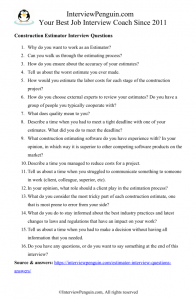Table of Contents
Why do you want to work as an Estimator?
Because you have experience in the field, connections in the industry, and ability to accurately estimate the costs and time needed to complete a construction project–your portfolio proves this. You can work with the documentation from the architects and planners, and have a good knowledge of the wages in the given industry, and how long it takes to complete different tasks on a construction site.
What is more, you have strong attention to detail, and analytical and math skills are on the list of your strengths. You have what it takes to become a great estimator, and you are sure that with your theoretical knowledge of technical writing and with your years of experience in the construction business, you’ll be quite accurate in your estimations, and successful in the job.
Can you walk us through the estimating process?
You should show them that you have a system in your work. Try to describe each step you will take in the process. Now, we know different methodologies, and I will describe just one here, and briefly. Feel free to talk about your own system, as long as it is logical, and described in a way your interviewers will understand.
- Determining the estimate basis. Collecting all information you have about the project, including previously developed schedule and project scope, is the first step. The level of detail varies, depending on the project phase, project type, and project complexity.
- Preparing base estimate. This is the most important stage and it covers development of estimated costs for all components of a project, excluding future escalation. You can use various sources here, including historical data and databases, market research, etc. At the end the base estimate should include all major milestones in the project, and a list of costs associated with reaching each milestone.
- Reviewing base estimate. This is where external subject matter experts review your initial documentation to ensure that it reflects accurately the project’s scope of work, that schedule and cost items are calculated in a reasonable and realistic way, and required components are not missing or double counted, and that the associated costs and schedule reflect realistically the market conditions.
- Determining risks. Once again, internal and external experts, risk analysts and managers should come up with their input, considering both positive and negative risks associated with the project in time. The cost impact of project risks should be included in the total cost estimation.
- Determine how the estimation will be communicated. Communication is an important factor of the job. As an estimator you should decide about the information that will be communicated to various stakeholders of the project, and the most appropriate way of communicating the information to each interested party. Often the words are as important as the numbers you use.
- Conducting an independent review. Self explanatory. Most construction projects are too big and estimates too important to pass without a review of a third party. Ensure the interviewers that you count with having your estimates reviewed before the final approval of the managers.
How do you ensure about the accuracy of your estimates?
Estimates rarely prove accurate, but it makes a difference whether the eventual costs are 10% higher or 200% higher than the original estimation. Countless unfinished construction projects around the country stand as a proof of terribly inaccurate estimates. The developer ran out of money and left the project before completing it…
You can again suggest different ways of trying to make the most accurate estimates:
- First and foremost, you take your time to make your estimates, and you collect as much initial data as possible–because if initial data about the project are inaccurate, everything else will follow in the downward direction from there on.
- You are aware that you can make a mistake, and you always incorporate different Subject Matter Experts in your estimation process, to review your work and to criticize it, in various stages.
- You try to think one step ahead, and consider different variable and market conditions, to make sure you won’t underestimate any risks and factors that will have impact on the project costs in the future.
- Last but not least, you approach your job with utmost responsibility and attention to detail, double checking everything and not underestimating any variables.
Tell us about the worst estimate you ever made.
Lot of big egos work in this business. They do not want to hire another one… You should be able to admit making a mistake, instead of blaming market conditions or some external factors for the wrong cost estimation you made.
At the end of a day, as an estimator you should have counted with the impact of market conditions. You should have included them in your analysis. The same is true for positive and negative external factors.
Admit your mistake, and explain the lesson you learned with your bad estimate. There is nothing like a failure in this business when you have the right mindset. You either succeed,or you learn. You did the second with your terrible estimate, and you won’t repeat the same mistake again.
How would you estimate the labor costs for each stage of the construction project?
Try to suggest a few tools and techniques that should help you with an accurate estimation of labor costs–which is often the Achilles’ heel of an estimate process, not only in the construction business.
You can suggest splitting the project to the smallest possible cycles, and allocating the exact amount of labor (in hours) to each task and cycle and milestone. Than you will work with salary surveys and historical databases, trying to set the right price for each hour of labor. Calculating everything, you should get at least a somehow accurate estimate.
Of course things change in the labor market, and one worker may do the job twice as fast as the other one, and this is something you cannot foresee as an estimator. Hence you will try your best, but the eventual labor costs may end up higher than your estimate–regardless of your detail oriented approach.
Other questions you may face in your Estimator job interview
- How do you choose external experts to review your estimates? Do you have a group of people you typically cooperate with. If you do, how did you choose them?
- What does quality mean to you?
- Describe a time when you had to meet a tight deadline with one of your estimates. What did you do to meet the deadline?
- What construction estimating software do you have experience with? In your opinion, in which way it is superior to other competing software products on the market?
- Describe a time you managed to reduce costs for a project.
- Tell us about a time when you struggled to communicate something to someone in work (client, colleague, superior, etc). How did you eventually manage to get your message over?
- In your opinion, what role should a client play in the estimation process?
- What do you consider the most tricky part of each construction estimate, one that is most prone to error from your side?
- What do you do to stay informed about the best industry practices and latest changes to laws and regulations that have an impact on your work?
- Tell us about a time when you had to make a decision without having all information that you needed.
- Do you have any questions, or do you want to say something at the end of this interview?
* You can also download the list of questions in a one page long PDF, print it, and practice your interview answers anytime later:
Conclusion, next steps
Interview for a job of an Estimator definitely belongs to difficult job interviews. Unless you have experience and prepare for the questions, it will be almost impossible to succeed.
On the other hand, the job requirements are quite high, and not many people meet them. Hence you can be the only person interviewing for the job, or you will compete with one or two other applicants. This makes your situation at least a little bit easier…
Prepare for the questions, and do a good research about your future employer. You should not underestimate anything if you want to succeed…
May also interest you:
- Building Inspector interview questions.
- Interior Designer interview questions.
- Architect interview questions.


